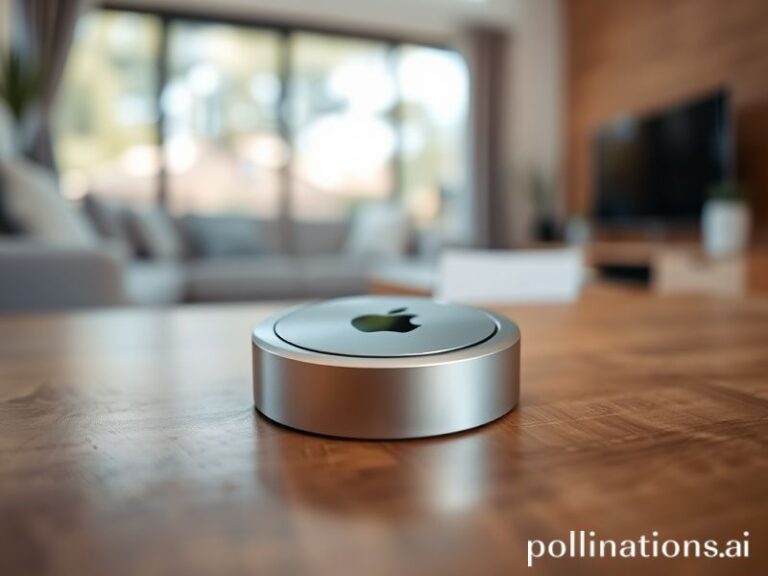IYO SKY: How Humanity Managed to Monetize the Atmosphere and Still Feel Empty Inside
IYO SKY AND THE ART OF SELLING NOTHING TO EVERYONE—A GLOBAL MASTERCLASS IN ABSURDITY
By Our Man in the Cloud Layer, still coughing up micro-plastics
Tokyo, Paris, Lagos, São Paulo—wherever you are this week, the phrase “iyo sky” is drifting across group chats, TikToks, and boardrooms with the eerie inevitability of radioactive pollen. To the uninitiated it sounds like a budget airline (“We only crash metaphysically”) or perhaps a new crypto coin backed by cumulonimbus futures. In truth, it is both and neither: a Japanese-English portmanteau coined by two Hokkaido art students who discovered that if you point a phone at any patch of sky and mutter “iyo”—roughly “hey, look”—an algorithm will stamp the frame with an ethereal overlay of cherry-blossom emojis and a 0.001% chance of winning a non-fungible cloud. A billion eyeballs later, multinational conglomerates have decided this vaporware is worth more than several Balkan GDPs.
The mechanics are elegantly meaningless. Snap, chant, mint. Each upload seeds a digital twin of your personal sky fragment onto a decentralized mesh run on surplus server heat in former Siberian gulags—because nothing says “progress” like reheating Siberia. Corporations purchase bulk rights to these fragments, repackage them as “climate-positive screen savers,” and sell them back to the same users at a 9,000% markup. Somewhere, a McKinsey partner just bought a third vineyard. Meanwhile, the carbon footprint of every iyo-sky transaction equals boiling 1.4 kettles of artisanal despair.
Global implications? Oh, they bloom like mushroom clouds. In India, farmers crowdfund monsoon insurance by iyo-skying their drought-stricken horizons; venture capital calls it “agritainment.” European regulators draft the “Sky Sovereignty Directive,” insisting every uploaded cumulus carry a GDPR-compliant privacy notice. The Pentagon quietly funds a pilot program to weaponize sky-meme sentiment analysis—because if you can weaponize boredom, you can weaponize anything. And in the South China Sea, naval destroyers now sail with official iyo-sky influencers on deck, soft-power proof that even territorial disputes can be gamified.
Human nature, ever the reliable clown, has responded with predictable lunacy. Couples divorce over whose cloud portfolio performed better; monks in Myanmar monetize meditation livestreams by promising “enlightenment airdrops.” A Norwegian teenager became a millionaire selling “rare noctilucent rights” to Silicon Valley executives who will never see the aurora without a spreadsheet. The same executives, of course, complain that the sky is becoming “too democratized,” which is oligarch for “why are poor people in it?”
Irony, that tired old trouper, keeps dying and resurrecting. The more we digitize the heavens, the less we look up. Air-quality apps now display real sky tint via augmented reality so users can safely ignore the actual pea-soup overhead. Tokyo’s newest luxury condo advertises “sky-free living”—windowless apartments whose walls are perpetual iyo-sky feeds, because authenticity is for peasants. One wit on Reddit observed that the firmament has become the world’s largest NFT: everyone owns a piece, nobody can hang it in their living room, and the server bill is due at the heat death of the universe.
And yet, and yet. Strip away the grift and you glimpse something almost touching: eight billion people pointing phones at the same sky, pretending they’re not lonely. It’s the digital equivalent of waving at astronauts—an admission that we’re all stuck on the same slowly roasting rock. The tragedy isn’t that we monetized the sky; it’s that we had to buy back our own wonder, subscription-based, terms and conditions apply.
Conclusion? The iyo-sky phenomenon is neither fad nor revolution. It is the logical endpoint of a species that turned stardust into credit scores. Tomorrow the meme will evaporate like morning dew—and by next week, we’ll be bidding on moonlight futures. Until then, keep your eyes on the cloud layer, dear reader. Someone up there just trademarked your next breath.







